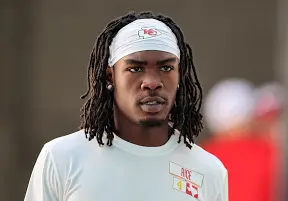
In the heart of Kansas City, where the rhythms of football pulse through the streets and alleys, Rashee Rice, a rising star wide receiver for the Kansas City Chiefs, found himself at the epicenter of controversy. It all began innocently enough, with a routine press conference following a grueling practice session. Reporters gathered around Rice, hungry for a soundbite, a glimpse into the mindset of one of the NFL’s brightest talents.

As the questions flew, Rashee’s demeanor remained cool and collected. He fielded inquiries about the upcoming season, his training regimen, and the team’s chances of reclaiming the Super Bowl title. But then, in a moment of unguarded candor, Rashee veered off script.
“You know,” he said, his voice tinged with a hint of defiance, “sometimes accidents happen on the field. It’s a brutal game, and injuries are just part of the deal. But when you step between those lines, you gotta be prepared for anything.”
His words hung in the air, a bold proclamation that sent shockwaves through the NFL world. Accidents? Injuries? Was Rashee suggesting that the violent collisions that define the sport were simply a matter of chance? The media pounced on his statement, dissecting it from every angle, while fans and fellow players alike weighed in with their own opinions.
For Rashee, the backlash was immediate and intense. Critics accused him of callousness, of trivializing the very real dangers faced by athletes on the gridiron. Former players spoke out against him, recounting their own struggles with injuries and the lasting toll it had taken on their bodies and minds. Even within the Chiefs organization, there were whispers of disapproval, murmurs that Rashee had crossed a line that should never be crossed.
But amidst the storm of controversy, Rashee remained steadfast. He refused to back down, insisting that his words had been misconstrued, taken out of context by those eager to vilify him. He doubled down on his belief that accidents were an inherent part of the game, a fact that every player had to accept if they wanted to succeed.
As the days turned into weeks, the furor surrounding Rashee’s comments began to die down. The media moved on to other stories, other scandals, leaving Rashee to focus on the upcoming season. But the fallout from his words lingered, casting a shadow over his reputation and his career.
On the field, Rashee was as electrifying as ever, dazzling fans with his speed, agility, and knack for making acrobatic catches. But off the field, he found himself ostracized by many of his peers, labeled as a pariah within the tight-knit brotherhood of NFL players.
Still, Rashee refused to be cowed. He continued to speak his mind, to express his views on the game and the challenges it presented. And slowly but surely, a strange thing began to happen. Despite the controversy that had initially surrounded him, Rashee found himself gaining a newfound respect, even admiration, from some corners of the NFL world.
Former players who had initially criticized him began to reconsider their stance, acknowledging the truth in his words, however uncomfortable they might be. Fans, too, started to see Rashee in a different light, recognizing the courage it took to speak out in an industry where conformity was often valued above all else.
And as the season wore on, Rashee’s performance on the field spoke for itself. He silenced his critics with each dazzling catch, each game-changing play, reminding everyone why he had been hailed as one of the most exciting talents in the league.
In the end, Rashee Rice’s journey was a testament to the power of conviction, of standing firm in the face of adversity and refusing to be silenced. His words may have sparked controversy, but they also sparked a conversation, forcing the NFL world to confront the harsh realities of the game they loved.
And as Rashee stood on the field, basking in the glow of victory, he knew that no matter what the future held, he would always be remembered as the man who dared to speak his truth, no matter the consequences.
Leave a Reply